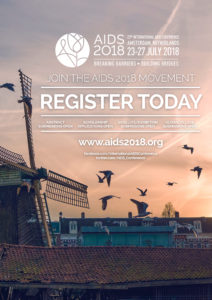 In addition to a strong abstract-driven programme, the 22nd International AIDS Conference (AIDS 2018) will offer symposia, workshops and interactive sessions developed by an international committee of HIV scientists, global leaders, policy makers, researchers and advocates.
In addition to a strong abstract-driven programme, the 22nd International AIDS Conference (AIDS 2018) will offer symposia, workshops and interactive sessions developed by an international committee of HIV scientists, global leaders, policy makers, researchers and advocates.
Here is a first glimpse of what you can expect in Amsterdam, which you can also browse in our preview of the conference programme. See an overview of the early programme preview below.
Improving treatment and care outcomes
- Updates on ART options and outcomes, with a particular focus on treatment across the lifespan and in key and vulnerable populations.
- Addressing NCDs in resource-limited settings.
- Presenting new data on co-infections and looking at old, and new, threats in infectious diseases in the context of HIV.
The future of prevention
- Exploring different perspectives on why combination prevention, while highly effective, is not available in many settings.
- Understanding key population community-led health services (KP-CLHS) as an effective tool in the prevention toolbox.
- Exploring the future of PrEP as part of combination prevention, taking into account funding concerns, uncertain treatment access for many people, lessons learned to date regarding PrEP implementation, and design issues for future trials.
Understanding HIV pathogenesis
- State-of-the-art updates on broadly neutralizing antibodies (bNabs) and their use in the development of a potential vaccine and a cure.
- Understanding HIV persistence and community participation as keys to developing a cure for HIV, long-term remission off ART.
- Opportunities to tackle the virus at the moment of transmission, recruit the host and manipulate the environment in the fight to end HIV transmission.
Key and vulnerable populations
- The evolving landscape of drugs, drug policy and harm reduction in the context of rising HIV transmission and political resistance.
- Empowering young people to access services and make healthier choices through comprehensive sexuality education (CSE).
- Training implementers to play an active role in changing gender norms.
Insights-driven programming
- New approaches to using big data to strengthen national HIV responses and deliver improved and effective focused programming.
- How new innovative approaches to big data allow us to better reach the right audience with the right intervention.
- Exploring ethical issues in the use of state-of-the-art methodologies and interventions to tailor interventions to local populations.
Under prioritized epidemics
- Advancing human rights and legal reforms with a focus on sexual minorities, prisoners, people who use drugs and transgender people in Eastern Europe and Central Asia.
- New approaches on how to address the needs of children and adolescents living with HIV from Ukraine, featuring perspectives by healthcare providers and policy makers.
- Insights on political leadership to advocating for the needs of vulnerable communities, with country examples including Kyrgyzstan and Senegal.
Source: AIDS 2018



